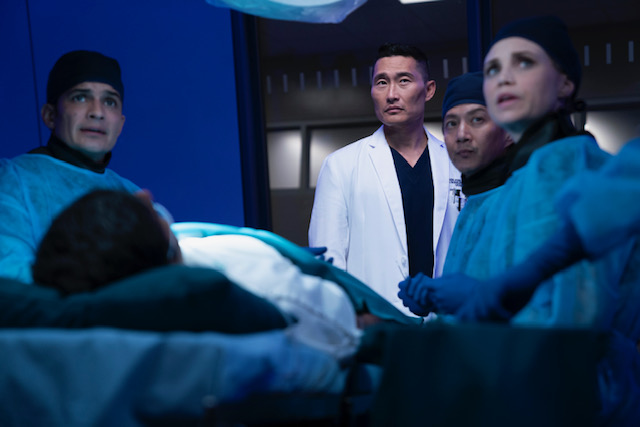

This feeling of relief then led to guilt, the doctor explains, and the result was paralysis. Back in the hospital, Moss awakens from his trance, and the doctor postulates that after seeing Finch shot, he experienced a momentary flash of relief that the bullet had wounded Finch, instead of him. Now finding that he is unable to walk, Moss fires four shots to summon the team, who must carry him to the dinghy. Suddenly, he sees Finch crawl into a nearby clearing and die. Moss volunteers to wait at the camp while the others go the beach to inflate the dinghy.

to cross the beach and uncover the dinghy, instructing each of them to fire four quick shots if they encounter trouble. From their position near the beach, the team listens to Finch's plaintive cries as he is tortured by Japanese soldiers. During a subsequent session, however, Moss recalls that he had asked Robinson for permission to return for Finch, but had been refused. Back in the hospital, Moss wakes up from his trance feeling that he was responsible for Finch's death. Realizing that he is badly injured, Finch tells Moss to leave with the maps. After Moss and Finch become lost, however, Finch blames Moss and almost calls him "nigger." Just as a disappointed Moss is forced to acknowledge Finch's racist feelings, Finch is shot. During their breaks from collecting data, Moss and Finch plan the restaurant and bar that they will open when they return home. When the shot is administered, Moss recalls that after landing on the beach, the team buried their rubber dinghy in the sand. Back at the hospital, the doctor begins a treatment called "narco-synthesis," in which drugs are used to trigger repressed memories.

Baker immediately to complain about Moss's race, but is told that he was the only surveyor to volunteer. When Moss arrives, Finch, his old school chum, is thrilled to see him, while Robinson expresses dismay. Everett, a cartographer named Finch and another soldier named Mingo.

Robinson, to recount for him their recent reconnaissance mission: Robinson recalls that he had chosen his best men for a four-day mission to survey a Pacific island occupied by Japanese forces. After the doctor finds no physical injury to account for his condition, the doctor asks Moss's superior, Maj. During World War II, black soldier Peter Moss is admitted to a military hospital suffering from partial amnesia and paralysis.


 0 kommentar(er)
0 kommentar(er)
